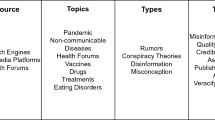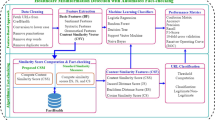Abstract
In recent years, a lot of false information in medical and healthcare domains has emerged and spread over the Internet. Such false information has become a big risk to public health and safety. This study investigates this problem by analyzing data collected from two fact-checking websites, 416 medical claims from Snopes.com and 1,692 healthcare-related statements from PolitiFact.com. Topic analysis reveals frequent words and common topics occurring in these claims spread online. Furthermore, using text-mining and machine-learning techniques, this study builds prediction models for detecting false information and shows promising performance. Several textual and source features are identified as good indicators for true or false information in medical and healthcare domains.
Access this chapter
Tax calculation will be finalised at checkout
Purchases are for personal use only
Similar content being viewed by others
References
Kumar, S., Shah, N.: False Information on Web and Social Media: A Survey, April 2018
Sloan, L., Quan-Haase, A., Rubin, V.L.: Deception detection and rumor debunking for social media. In: The SAGE Handbook of Social Media Research Methods, pp. 342–363 (2017)
Luca, M., Zervas, G.: Fake it till you make it: reputation, competition, and yelp review fraud. Manag. Sci. 62(12), 3412–3427 (2016)
Shu, K., Wang, S., Liu, H.: Beyond news contents: the role of social context for fake news detection. In: Proceedings of the Twelfth ACM International Conference on Web Search and Data Mining, pp. 312–320 (2019)
Ott, M., Choi, Y., Cardie, C., Hancock, J.T.: Finding deceptive opinion spam by any stretch of the imagination. In: Proceedings of the 49th Annual Meeting of the Association for Computational Linguistics: Human Language Technologies, vol. 1, pp. 309–319 (2011)
Li, J., Ott, M., Cardie, C., Hovy, E.: Towards a general rule for identifying deceptive opinion spam. In: Proceedings of the 52nd Annual Meeting of the Association for Computational Linguistics (vol. 1: Long Papers), pp. 1566–1576 (2014)
Juuti, M., Sun, B., Mori, T., Asokan, N.: Stay on-topic: generating context-specific fake restaurant reviews. In: Lopez, J., Zhou, J., Soriano, M. (eds.) ESORICS 2018. LNCS, vol. 11098, pp. 132–151. Springer, Cham (2018). https://doi.org/10.1007/978-3-319-99073-6_7
Purnomo, M.H., Sumpeno, S., Setiawan, E.I., Purwitasari, D.: Keynote speaker II: biomedical engineering research in the social network analysis era: stance classification for analysis of hoax medical news in social media. Procedia Comput. Sci. 116, 3–9 (2017)
Tsay, M.A.J.: The internet, ethics, and false beliefs in health care. AMA J. Ethics 20(11), 1003–1006 (2018)
Blei, D.M., Ng, A.Y., Jordan, M.I.: Latent Dirichlet allocation. J. Mach. Learn. Res. 3(Jan), 993–1022 (2003)
Author information
Authors and Affiliations
Corresponding author
Editor information
Editors and Affiliations
Rights and permissions
Copyright information
© 2019 Springer Nature Switzerland AG
About this paper
Cite this paper
Li, J. (2019). Detecting False Information in Medical and Healthcare Domains: A Text Mining Approach. In: Chen, H., Zeng, D., Yan, X., Xing, C. (eds) Smart Health. ICSH 2019. Lecture Notes in Computer Science(), vol 11924. Springer, Cham. https://doi.org/10.1007/978-3-030-34482-5_21
Download citation
DOI: https://doi.org/10.1007/978-3-030-34482-5_21
Published:
Publisher Name: Springer, Cham
Print ISBN: 978-3-030-34481-8
Online ISBN: 978-3-030-34482-5
eBook Packages: Computer ScienceComputer Science (R0)




